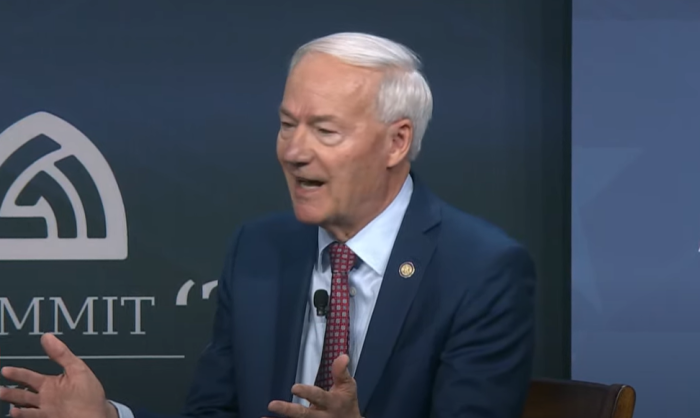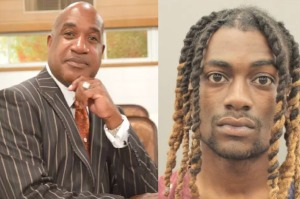Asa Hutchinson defends vetoing bill banning sex-change procedures for kids in Tucker Q&A
Former gov. says puberty blocker ban went too far: 'Parents ought to raise their children'

A former Arkansas governor and presidential candidate defended his veto of a bill banning the chemical and surgical castration of youth suffering from gender dysphoria as nearly two dozen other states have passed laws protecting children from such body mutilating procedures.
At the Family Leadership Summit in Des Moines, Iowa, where several Republican presidential hopefuls gathered to address Christian conservative activists six months ahead of the Iowa caucuses that will kick off presidential primary season, former Arkansas Gov. Asa Hutchinson defended his veto of legislation that banned puberty blockers, cross-sex hormones and body-mutilating surgeries for youth expressing temporary confusion about their sex. The bill ultimately became law with the Republican-controlled Arkansas Legislature successfully overriding his veto.
Former Fox News host Tucker Carlson, who held discussions with multiple GOP presidential contenders throughout the day, asked Hutchinson if he had “reassessed” his veto of the measure at any time in the past two years. The two previously sparred about it in an exchange on the former Fox News program “Tucker Carlson Tonight” in April 2021.
Hutchinson, who left office following the 2022 election, indicated that he had no regrets about vetoing the bill.
“Parents ought to raise their children,” he declared. “I believe that parents ought to be in control, and I also believe in the Constitution. I believe that God created two genders and that there should not be any confusion [about] your gender. But if there is confusion, then parents ought to be the ones that [guide] the children.”
“That, to me, is an important fundamental principle. Now obviously, you could take it too far, and if there would have been a bill that said you should not ever have transgender surgery as a minor, I would sign that,” Hutchinson insisted. “No parent should be able to consent to that permanent change.”
Hutchinson further argued, “This bill did go too far. It was unconstitutional; it interfered with parents, and so I sided with parents on that bill in managing the most sensitive issue that a parent can face.” He defended his veto as consistent with his belief in a “limited role of government.”
“I don’t think that California ought to be able to tell parents, ‘you need to have gender-affirming care for the children.’ The government should not do that,” he added, contending that the bill he vetoed fell into the same category, although it came down on the opposite side of the issue.
“I don’t like the schools pushing transgenderism,” he said. Hutchison also condemned former President Barack Obama for issuing guidance directing public schools to allow trans-identified students to enter bathrooms, lockers rooms and showers designated for the opposite sex.
Hutchison stressed, “I want the government to stay out. I want the parents and communities and our faith to guide us through these difficult decisions.”
As he defended his veto of the bill, Hutchinson took issue with the state of New Jersey “suing the school districts that want to be able to tell parents” that their child is identifying as a member of the opposite gender: “Parents have to have information. They shouldn’t be denied the ability to know what’s going on in the school with their child.”
Hutchinson concluded the discussion about the bill he vetoed by highlighting his personal opposition to body-disfiguring sex-change surgeries: “I don’t support that. I wouldn’t make that decision in my family about changing genders, and I don’t believe that taxpayers’ funds should be used for transgender surgery or treatment through Medicaid or Medicare or in our military.”
“I don’t believe that that should happen because traditionally, whether it’s the Hyde Amendment that you prohibit funding of abortion with taxpayers’ dollars because it violates the religious commitment of many people, the same principle should apply here. I’m saying one simple fundamental thing: that we have to have a debate as to what is the limited role of government. Let’s encourage parents to make decisions. Obviously, they can go too far and you draw a line and legislatures have to do that.”
As Carlson indicated throughout the discussion, efforts to prevent the dispensing of puberty blockers, cross-sex hormones and performing genital mutilation surgeries stem from concerns about the long-term impacts of such procedures. In addition to Arkansas, 19 other states have passed laws banning some or all of the procedures: Alabama, Arizona, Florida, Georgia, Idaho, Indiana, Iowa, Kentucky, Mississippi, Missouri, Montana, Nebraska, North Dakota, Oklahoma, South Dakota, Tennessee, Texas, Utah and West Virginia.
The American College of Pediatricians identifies the side effects of puberty blockers as “osteoporosis, mood disorders, seizures, cognitive impairment and, when combined with cross-sex hormones, sterility.” Possible long-term impacts of cross-sex hormones, as outlined by the American College of Pediatricians, include “an increased risk of heart attacks, stroke, diabetes, blood clots and cancers across their lifespan.”
Detransitioner Chloe Cole, who formerly experienced gender dysphoria but has seen her discomfort with her biological sex subside, filed a lawsuit earlier this year attributing mental health issues she experienced as a teenager to the “gender dysphoria treatment” she received from the defendants named in the complaint.
The lawsuit contended that the double mastectomy Cole received as a minor caused her to experience suicidal thoughts and noted that the entire ordeal left her with “deep physical and emotional wounds, severe regrets, and distrust of the medical system.”
In addition to the mental effects of gender transition surgeries, they also come with physical effects. Earlier this year, the campaign of Florida Gov. Ron DeSantis shared images of wounds and severe scars left behind after the surgical removal of healthy breasts and forearm tissue used to create fake, flaccid penises that cannot function for females seeking to present themselves as male in an effort to draw attention to the long-term consequences of such procedures.
The RealClearPolitics average of polls sampling voters’ intentions heading into the Republican presidential primaries, based on surveys conducted between June 13 and July 11, shows Hutchinson capturing 0.8% support. He remains far behind the frontrunner for the Republican nomination for president, former President Donald Trump, who has the support of 53.6% of primary voters and DeSantis, who secures 20.6% support.
Ryan Foley is a reporter for The Christian Post. He can be reached at: ryan.foley@christianpost.com





























